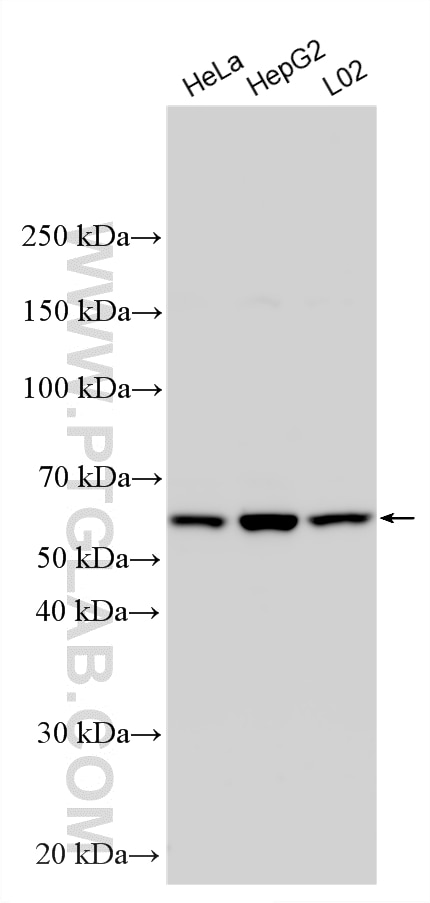Validation Data Gallery
Tested Applications
| Positive WB detected in | HeLa cells, HepG2 cells, L02 cells |
Recommended dilution
| Application | Dilution |
|---|---|
| Western Blot (WB) | WB : 1:1000-1:6000 |
| It is recommended that this reagent should be titrated in each testing system to obtain optimal results. | |
| Sample-dependent, Check data in validation data gallery. | |
Product Information
16895-1-AP targets RETSAT in WB, ELISA applications and shows reactivity with human samples.
| Tested Reactivity | human |
| Host / Isotype | Rabbit / IgG |
| Class | Polyclonal |
| Type | Antibody |
| Immunogen |
CatNo: Ag10420 Product name: Recombinant human RETSAT protein Source: e coli.-derived, PGEX-4T Tag: GST Domain: 1-313 aa of BC011418 Sequence: MYSGEKAYIQGLKEKFPQEEAIIDKYIKLVKVVSSGAPHAILLKFLPLPVVQLLDRCGLLTRFSPFLQASTQSLAEVLQQLGASSELQAVLSYIFPTYGVTPNHSAFSMHALLVNHYMKGGFYPRGGSSQIAFHTIPVIQRAGGAVLTKATVQSVLLDSAGKACGVSVKKGHELVNIYCPIVVSNAGLFNTYEHLLPGNARCLPGVKQQLGTVRPGLGMTSVFICLRGTKEDLHLPSTNYYVYYDTDMDQAMERYVSMPREEAAEHIPLLFFAFPSAKDPTWEDRFPGGECDCRIPTHQPVLSGCSPRCLLRG 相同性解析による交差性が予測される生物種 |
| Full Name | retinol saturase (all-trans-retinol 13,14-reductase) |
| Calculated molecular weight | 610 aa, 69 kDa |
| Observed molecular weight | 62-67 kDa |
| GenBank accession number | BC011418 |
| Gene Symbol | RETSAT |
| Gene ID (NCBI) | 54884 |
| Conjugate | Unconjugated |
| Form | |
| Form | Liquid |
| Purification Method | Antigen affinity purification |
| UNIPROT ID | Q6NUM9 |
| Storage Buffer | PBS with 0.02% sodium azide and 50% glycerol{{ptg:BufferTemp}}7.3 |
| Storage Conditions | Store at -20°C. Stable for one year after shipment. Aliquoting is unnecessary for -20oC storage. |
Background Information
RETSAT (Retinol Saturase) is an enzyme-encoding gene that plays a critical role in cellular metabolism, primarily involved in the saturation of retinol (vitamin A) and other molecules. It catalyzes the conversion of all-trans-retinol to all-trans-13,14-dihydroretinol, a process that links vitamin A metabolism to lipid and glucose homeostasis. It is highly expressed in the liver, adipose tissue, and kidney and is regulated by the PPARγ master regulator of adipogenesis (PMID: 28855500; 38128827). RETSAT also has a role in cancer cell survival, particularly in hypoxic tumor environments, by enhancing resistance to replication stress (PMID: 36109793).

